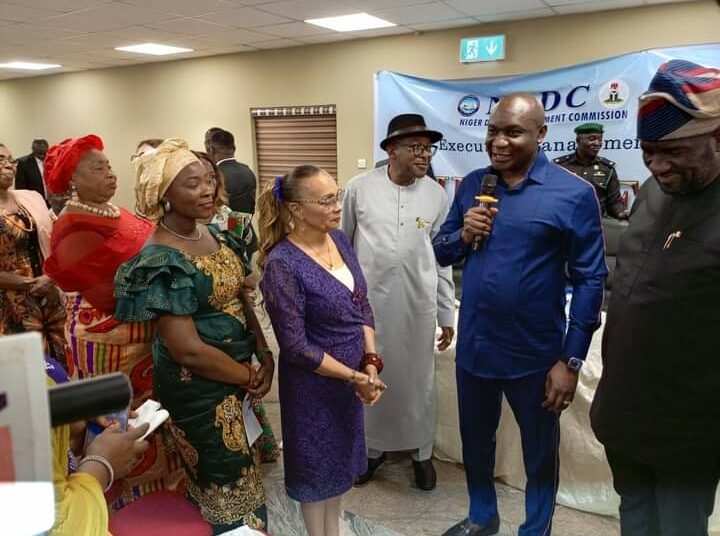SOCIETYEXTRA

NIGER DELTA WOMEN KEY TO REGION’S PROGRESS – NDDC BOSS
The Managing Director of the Niger Delta Development Commission (NDDC), Chief Samuel Ogbuku, has hailed women in the region as pivotal drivers of economic advancement, societal transformation, and community strength.
Speaking through the Commission’s Executive Director of Corporate Services, Hon. Ifedayo Sunday Abegunde, during the 2025 International Women’s Day celebration in Akure, Ondo State, Ogbuku emphasized the critical role women play in shaping national development at all levels.
Abegunde highlighted the significance of this year’s theme, “Accelerate Action: Invest in Women, Advance Rights, Leadership, and Equality,” describing it as not only timely but essential. He described women as agents of social change whose impact is central to building a transformed Niger Delta and a progressive Nigeria.
“This theme resonates deeply with the transformation we desire. It calls for a future where women are not sidelined but are equal partners in sustainable development, peace, and progress,” he said.
He called on women to speak out, get actively involved, and take charge to help reverse the decline in the nation’s social, political, and economic systems.
“It’s important to remember that the fight for justice, equity, and development that led to the creation of the NDDC wasn’t led by men alone,” he noted. “Women played critical, selfless roles as mobilizers, peacemakers, advocates, and caregivers—even in difficult times.”
He credited the perseverance of women across the region for helping sustain the momentum that birthed the Commission in 2000, adding that their efforts have continued to shape progress in the Niger Delta.
“From organizing cooperatives and leading grassroots development to preserving community unity in times of conflict, women have consistently held the region together,” he said. “Any vision of development that excludes women is incomplete.”
Ogbuku reaffirmed NDDC’s commitment to women’s empowerment, aligning the Commission’s agenda with the United Nations Sustainable Development Goals—particularly SDG 5 on Gender Equality and SDG 10 on Reduced Inequality.
He outlined the Commission’s efforts to promote women’s rights, leadership, and inclusion through awareness campaigns, capacity building, and support programs across health, education, and economic sectors.
Calling for collaboration, he urged civil society groups, traditional leaders, state and local governments, and the private sector to join in eliminating the cultural and economic barriers limiting women.
“To the men here, I urge you to become allies and champions of a future where the women in your lives—your daughters, wives, mothers, and sisters—can reach their full potential,” he said. “We cannot achieve meaningful development in the Niger Delta without empowering our women.”
Delivering the keynote address, Comrade Victoria Akomolafe, a retired headteacher, stressed that empowering women is not only a moral obligation but a critical economic and social strategy. She noted that although women in the Niger Delta have faced marginalization, their empowerment has the potential to drive transformative change.
She praised the NDDC’s ongoing initiatives, noting that women in the region have been leaders in grassroots movements advocating for environmental justice and sustainable progress.
“Their involvement in decision-making processes ensures that development projects reflect the true needs of the entire community,” Akomolafe stated.
Panelists Victoria Akinsanmi, J.D. Akeredolu, and Omowumi Oni echoed the importance of women’s inclusion in sustainable development. They emphasized that empowered women contribute significantly—not just within families but also at the community and national levels.
The panel concluded that inclusive development is only possible when women are given equal opportunities to apply their skills, share their perspectives, and influence decision-making.
The speakers urged continued support from stakeholders, including government bodies and the public, for initiatives that promote women’s health, education, and economic empowerment as essential pillars of sustainable development.
"This represents a significant development in our ongoing coverage of current events."— Editorial Board









